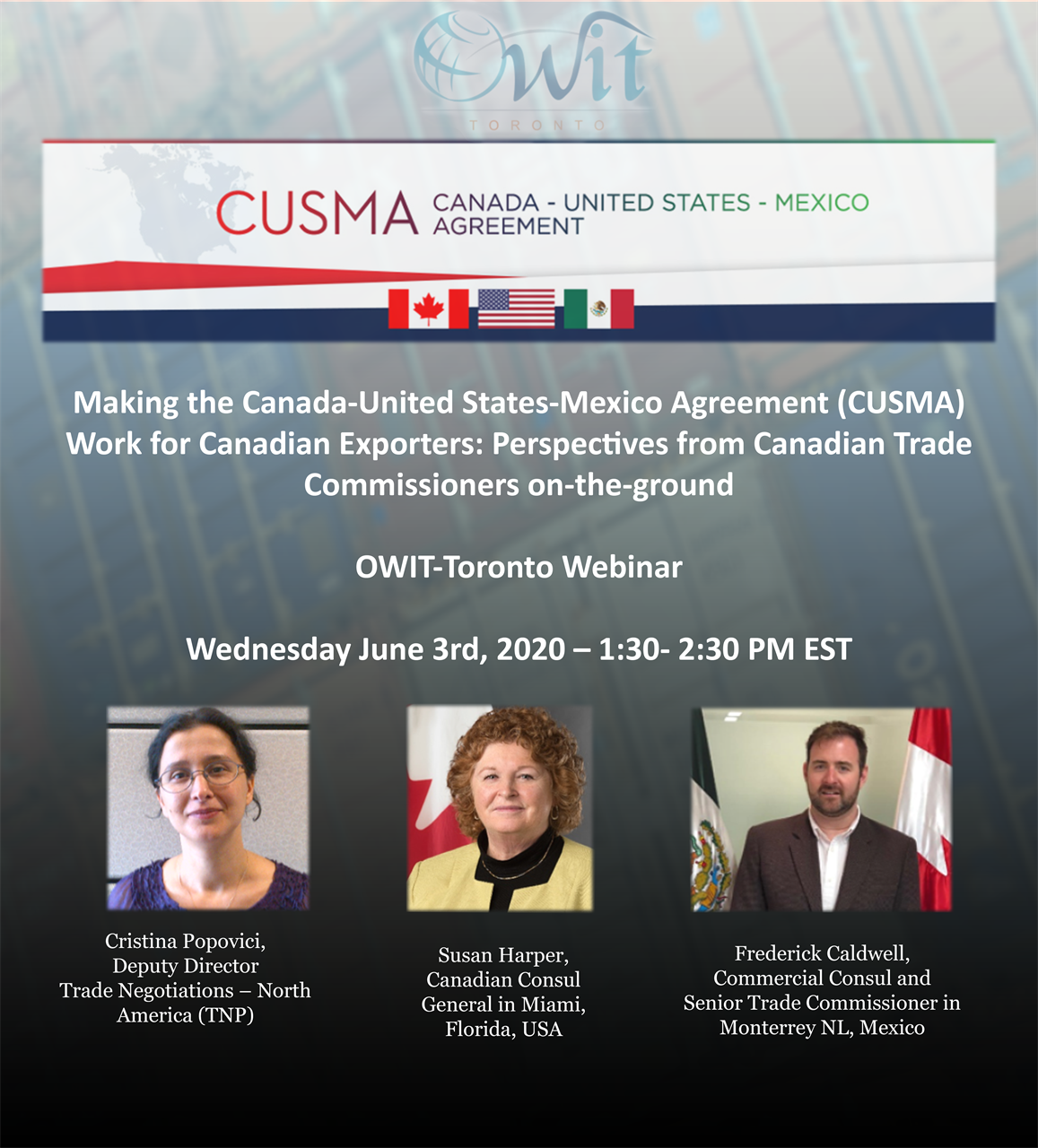OWIT-Toronto hosted webinars in June on two of Canada’s major free trade agreements (FTAs) in order to help members better understand how to take advantage of them. Supported by Global Affairs Canada and the Ontario government, the first one focused on the Canada-US-Mexico Trade Agreement (CUSMA), often referred to as the new NAFTA, and was held prior to its official entry into force on July 1. It featured senior Canadian trade officials based in the three countries, who outlined key changes in the agreement and opportunities for Canadian companies. The second webinar – sponsored by the Women Entrepreneurship Knowledge Hub - highlighted specific opportunities for women exporters flowing from Canada’s FTA with the European Union - the Comprehensive Economic and Trade Agreement (CETA) - and the experiences of two women entrepreneurs successfully exporting there.
CUSMA webinar (June 3, 2020): Making the Canada-United States-Mexico Agreement (CUSMA) Work for Canadian Exporters: Perspectives from Canadian Trade Commissioners on-the ground

Moderator: Aylin Luisi, Director, OWIT-Toronto, and VP, Public Affairs, UPS Canada
Speakers:
Cristina Popovici, Deputy Director Trade Negotiations – North America (TNP), Global Affairs Canada
- One of key objectives was to modernize and improve the agreement where possible.
- Some of the gains include liberalized trade and good regulatory practices, new Digital Chapter, Labour and Environment Chapters with dispute resolution built in; rules of origin strengthened for autos and parts and an increase in regional value content; electronic processes to facilitate cross-border movement of goods; and IP enhancements
- For Services and Investments, Canada preserves preferential access to US for professionals
- Challenges of negotiations included tariffs imposed on Canadian steel and aluminum by the US.
- Formal review mechanism – to be reviewed every 6 years
Susan Harper, Canadian Consul General in Miami, Florida (Susan.Harper@international.gc.ca )
- As part of Global Affairs Canada, the Trade Commissioner Service (TCS) has great initiatives to help Canadian companies to navigate the complexities of international markets:
- Key sectors in Florida include ICT, defence, cleantech and health
- COVID-19 is hitting Florida mostly in the sectors of tourism and hospitality; the supply chains are stressed but have survived.
- Florida's organizations are looking into new opportunities as assistance to business has continued.
- Why look at Florida as an export destination – 3 rd largest population state and 4 th largest for economy, has a very trade dependent economy and open reception to international partners, gateway to Latin America and Caribbean; Canada and Florida are very important trading partners; Florida ports and airports are very well connected. Florida has an extensive multimodal transportation system; All the big Canadian banks and Desjardins are very active there
- Supplier diversity has a lot of profile in Florida - women are encouraged to look into supplier diversity options as a way to enter the market
- Go For the Greens Conference is where TCS works well with Canadian women entrepreneurs.
- Trade missions will continue but may be virtual this year
- World Trade Centre is working to organize a trade show maybe partly online and partly on site for Canadian businesses interested in Florida, Latin America and Caribbean markets.
- Tips on doing business in Florida – avoid politics talk; give yourself a competitive advantage by accessing resources who speak Spanish and Portuguese since South Florida is truly trilingual; health, food, and energy security are very important in Florida especially during COVID – be very aware of that dimension of the Canada-Florida relationship
Frederick Caldwell, Commercial Consul and Senior Trade Commissioner in Monterrey NL, Mexico (frederick.caldwell@international.gc.ca)
- Canada has trade representatives in Monterrey, Guadalajara and Mexico City.
- Priority sectors for Canadian businesses in Northeast Mexico are:
-
- Automotive
- Information and Communications Technologies (local companies looking for AI, blockchain, mobility, cybersecurity, telehealth)
- Agri-food (gluten free, diabetic and gourmet foods are good opportunities for women exporter; Mexico City trade office has good connections with hotels)
- Clean Technologies
- Education (one of quickest growth areas – online platforms have good prospects)
- Aerospace
- Good opportunities exist to enter into supply chains
- The local manufacturing industry re-started operations mid May , but the auto sector is struggling with weak demand on a worldwide level.
- Owit-Monterrey and Toronto are working on a virtual trade mission
CETA Webinar- June 23, 2020: It’s Not Only about the US Anymore: Women Traders and Canada’s Free Trade Agreement with Europe (CETA)

Moderator: Susan Baka, VP International ,OWIT-TO, & President, Bay Communications & Marketing Inc.
- EU is a market of over 5oo million consumers
- CETA eliminates 98% of duties on Canadian goods
- Improves access for trade in services and simplifies entry procedures
- Commitment from both the Canadian and EU governments to help women expand internationally and take advantage of CETA
- Many women’s business organizations exist in the EU that can be approached as potential partners.
Panelists:
Stéphane Lambert, Senior Trade Commissioner, Mission of Canada to the European Union, Brussels (Stephane.Lambert@international.gc.ca )
- Three key reasons why CETA is highly relevant to Canadian women exporters: 1. EU is an economy power asset of high-income markets with plenty of opportunities for Canadian exporters; 2. profile of the opportunities aligns well with the strengths of Canadian women explorers, providing opportunities in niche sectors where women excel, including services; and 3. CETA addresses non-tariff barriers to trade that omen exporters are sensitive to, such as regulations, compliance and customs clearance, making it easier to access the benefits.
- Other advantages of CETA: has mobility provisions that make it smooth to enter the EU for a period of up to a year to deliver a contract and to establish a presence in the EU to move staff between Canada and the EU; opens up public procurement at all levels of government to Canadian businesses
- Key trends that match the strengths of women exporters include: selling digitally (demand for e-commerce, mobility solutions, software as a service, telework, building a more resilient workplace); modernization of healthcare (need for telehealth, digitization of health records, health data management, health wearables, e-help for home care platforms and applications for smartphones); building a more sustainable economy/ethical consumerism/, emphasis on green (demand for more sustainably sourced products and natural ingredients, natural cosmetics like soaps, sustainably sourced fish and seafood, responsible packaging); healthy eating and healthy living (demand for organic and gluten-free foods, healthy snacks, sustainable household products)
- Resources to help women leverage CETA include: regional offices of the Trade Commissioner Service, including a dedicated person to connect with Canadian women exporters; in-market trade commissioners; Business Women in International Trade activities within the TCS, including an annual newsletter and trade missions for women; the women’s ecosystem, including OWIT and women’s networks in the EU; and the broad trade ecosystem, including EDC and BDC, and logistics providers such as custom brokers and freight forwarders.
Shamira Jaffer, CEO, Signifi Solutions Inc., Toronto
- Signifi is an innovative robotic business to transform the retail landscape focusing on management, loss prevention and retail automation, with exports at 95%, of which 9% is to Europe.
- Europe is attractive because of the large size of the market, the cultural fit - with Canadians well liked there – and streamlined processes under CETA (such as no tariffs).
- Tips for success: have a local representative; access the free services of the TCS for help and advice (will make sure you don’t fall into any pitfalls like employment rules); tap into CanExport funding for things like translating websites into foreign languages, creating marketing brochures, attending trade shows, and hiring a local consultant to help set up an entity; and find something you have in common with potential clients because Europeans put more efforts into getting to know you on a more personal level.
Manon Pilon, President & CEO, Laboratoires Druide® & EuropeLab Laboratory®; Founder, Derme & Co., Montreal
- Large manufacturer of organic certified skincare products, using sustainable and ethically sourced ingredients, with divisions for spa, personal care and private label skin care.
- Chose France to export to because of language and appreciation for organic products.
- Certifying with the largest organization in the world was helpful to penetrate the market. That combined with the high Canadian standards for natural skincare products placed the company in a very favourable position.
- Biggest challenge was to register the product and ensure that the label content resonated with consumers. Local help with regulatory expertise was sought.
- Tips for success: Utilize Trade Commissioners who are like partners (were very helpful in making introductions for her company to key players in the Parisian market like Four Seasons); attend trade shows and meet people in your industry; and join organizations, network and help each other.



